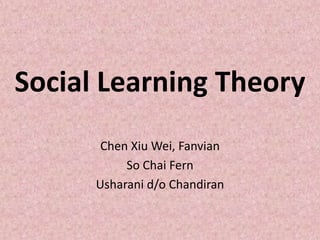
Social learning theory
- 1. Social Learning Theory Chen Xiu Wei, Fanvian So Chai Fern Usharani d/o Chandiran
- 2. What is Social Learning Theory? It states that social behaviour (any type of behaviour that we display socially) is learned by observing and imitating the actions of others. according to this theory, by being rewarded and/or punished for these actions. For example, if a child sees his older brother bring home a good report card and he gets a great reward for it, the child may observe this, see the older brother get rewarded, and then learn that having a good report card will get rewarded so he should do it too.
- 3. Core Concepts • Learn through observation • Internal mental states are an essential part of this process • Observation and imitation process will not cause change in behaviour
- 5. Necessary Conditions • Attention: Paying attention • Retention: Ability to store information • Reproduction: Perform the behaviour observed • Motivation: One has to be motivated to imitate
- 6. Example Learning Long Jump • Attention: Teacher teaches the steps on how to jump and demonstrates the technique while the students pay attention and observe
- 7. Example Learning Long Jump • Retention: Teacher asks questions about the technique to test the students’ understanding. Students answer the questions asked
- 8. Example Learning Long Jump • Reproduction: Students repeat and jump with the technique that the teacher has demonstrated
- 9. Example Learning Long Jump • Motivation: Teachers give comments on students’ learning progress based on students’ performance: Compliment the good and encourage the poor
- 10. THE END
